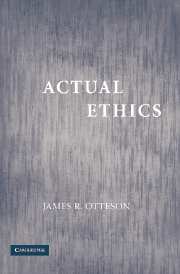9 - What Is Good for the Goose
Published online by Cambridge University Press: 17 November 2009
Summary
Throughout this book I have used the dread word happiness, and I think an impartial spectator would judge that fact to impose upon me an obligation to say something substantive about what exactly the word means. I have several times talked about happiness. I have argued, for example, that people must find their own paths to it and that no two people's paths will be exactly alike, claims that together constitute a large part of the reason why a wide scope of individual freedom is necessary. Indeed, most of the argument of this book has explicitly or implicitly assumed that happiness is everyone's ultimate goal, that, as Aristotle put it, happiness is the one good that is desired for its own sake and not for the sake of anything else. These should not be left to stand as mere assertions, however. That means that the time has come for me to put my money where my mouth is and say something about what I believe human happiness actually is and how it might be achieved. My argument that there is no single good for all people carries with it the implication that one cannot give a single account of “the good,” and that might provide an excuse for me to avoid having to address this topic.
- Type
- Chapter
- Information
- Actual Ethics , pp. 319 - 340Publisher: Cambridge University PressPrint publication year: 2006



